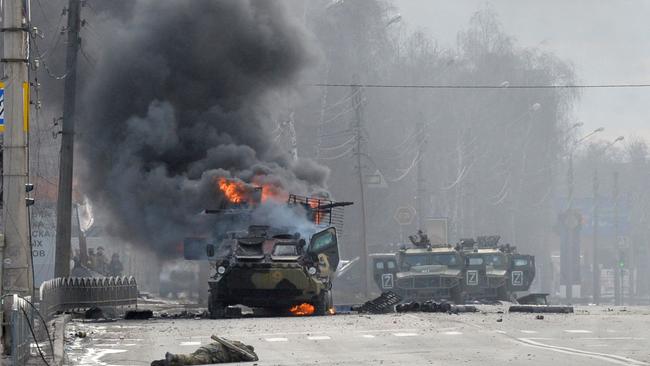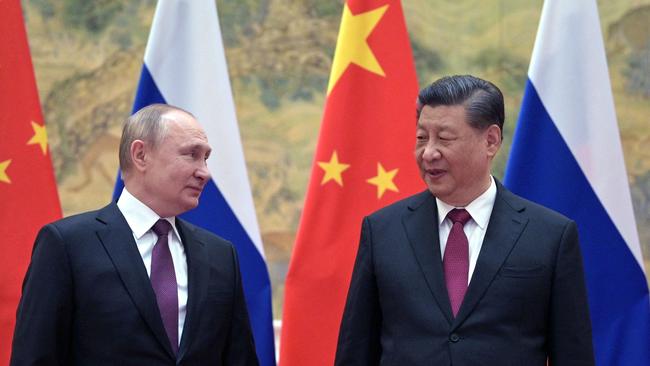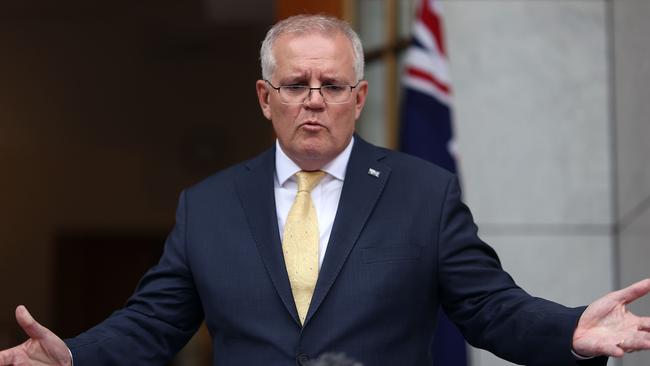A new world disorder: Morrison calls on the West to unite against Russia and China
Scott Morrison hopes the Ukraine invasion will ‘rip away the veil’ that has concealed the true nature of Russian and Chinese authoritarianism to expose all he has been warning about.

In an exclusive and expansive interview on the global crisis, the Prime Minister sees a ray of optimism amid the unprovoked aggression against Ukraine, saying this should be “a very big wake-up call” that reunites liberal democracies to meet a polarising and escalating threat.
Morrison says he believes the two autocracies, Russia and China, have an “instinct” to work together but offers different views of their positions. Russia must now be relegated to a “pariah state” along the lines of North Korea, while he seeks to make Ukraine a test case of China’s beliefs before the world, demanding Beijing break from Moscow to join the sanctions campaign.
“By invading Ukraine, Russia has self-nominated as a pariah state,” Morrison says. “They should now pay the international price of being regarded as one, like North Korea, Myanmar and others who turn their back on values that underpin our global rules-based order. When you look at the five countries who voted against the resolution at the UN it’s not a group you’d want to be in.”
The five states that opposed the UN General Assembly vote demanding that Russia immediately end its military operations in Ukraine were Russia, Belarus, North Korea, Syria and Eritrea.
Morrison has taken a strong stand against Russia but has been globally prominent in calling out China’s public excuses for Vladimir Putin’s invasion. This builds on his pushback over nearly three years against Beijing’s economic coercion of Australia. The Ukraine crisis is the latest stage in Morrison’s global diplomacy to expose China as an autocratic power that plays a double game on the world stage.
Asked what he expected from China, Morrison says: “Join all the sanctions that we are imposing. It’s simple. They should be responding in the same way as so many other countries. No country is going to have a bigger impact on Russia’s aggression than China. But instead they’re meeting with them at the Olympics and they’re throwing them an economic lifeline. They’re creating a moral equivalence between the claims of Russia and Ukraine.
“Now this is a common tactic because the sort of world order that authoritarian regimes like is one that is highly transactional. There’s a deal: you do what we want and you get prosperity and no threats. And that’s not a world I think Australians want to live in – or other nations around the world. This idea there’s some equivalence here, that there are justly competing claims about what’s occurring in Ukraine, is nonsense.”
Referring to Beijing’s claims to be a global leader and upholder of the UN system, Morrison says: “This is my appeal. To pretend to that role, which China clearly does, requires the complete denunciation and joining with other nations to condemn what Russia has done and demand they withdraw without qualification. And if they don’t think it requires that, then what sort of world order do they believe should exist?”
Morrison says the West’s folly in past dealings with Putin was to believe he thought the same way and could be managed by diplomacy. This has proven to be false. Asked if he had believed Putin was going to invade Ukraine, Morrison had no doubt. He says his view was “he’d do it from day one, without question”.
“I don’t think many in Europe thought that,” Morrison says. “The same people who were saying he wasn’t going to do it are now saying that he’s gone mad. No, he’s the same guy. That’s what these autocrats are like, we’ve seen them before. There is always this view, ‘oh, he’ll come around’, or let’s apply equivalence. On occasions that approach can be effective, but not with this character.”
Morrison says he believes the meeting in Beijing early last month between Putin and China’s President Xi Jinping that finalised a 5000-plus word agreement between their nations is a “troubling” development. He says their “instinct” is to transform the global order. “Are they holding weekly meeting to plan it out – no, I don’t think so,” he says. “There’s an opportunistic element to all of this. They are very quick to co-operate, if you like there’s an instinctive alignment.”
The Prime Minister says that from Australia’s perspective the Putin-Xi meeting was “not surprising”. He says: “We have been warning of an arc of autocracies for some time. This is redefining the global political landscape. There is a polarisation that is occurring and I think the events in Ukraine highlight that. For many countries Ukraine has brought this issue to the fore.
“For us, we were always clear-eyed about this. That’s why we’ve been warning and taking action – and sometimes those actions were met with stiff resistance, being told ‘you can’t say that’. I don’t share those views. We have to be clear-eyed because the threats are very significant.”

Morrison says the sanctions being imposed on Russia are “significant” and will have a near-term impact. “The evidence so far is very encouraging,” he says. “We’ve seen a massive depreciation of the rouble, a significant increase in domestic interest rates in Russia, the quite successful targeting of oligarchs and individuals on closing the net on Putin’s network imposing a very heavy price.
“Now we never believed such sanctions would deter him from this step. We’re always had a clear-eyed view about Putin. We never held the view there was some redemption possible for him in terms of his own aspirations.
“If Russia is allowed to do this without paying a heavy price in its economy and its reputation then that only provides licence for others to consider the same. And that is not in Australia’s interests.”
Asked if Putin’s invasion might become a global turning point in leading nations to take a tough stance against Russia and China, Morrison says: “It is certainly my aspirational hope this will be a very big wake-up call about the emergence of autocracies and authoritarian regimes who are simply about rewriting the rules of the international order.
“We have had an international order that was founded, effectively by liberal democracies, after the second world war. It’s always had very altruistic ambitions and that means it’s been very accommodating of many regimes in the hope that there would be some reform of those regimes. Well, I don’t think that’s worked. I think there’s a clear lesson in all of that. I think the differences between the non-autocratic states must now become smaller and irrelevant because more significant issues have come to the fore.”
Asked how he sees Australia’s role in the global debate over Ukraine, Morrison says: “We’ve been on the leading edge but with our partners. I think we’ve been careful not pretending to a role that’s not ours. But we have been proactive. We have shown initiative as we should.”
While Russia’s invasion may prevail in military terms, Putin will pay a price that ultimately may threaten his power. Russia faces a large degree of economic isolation with a related attack on its currency that sharply erodes its purchasing power. The pivotal step, surely unanticipated by Putin, has been freezing reserves held overseas by Russia’s central bank, such assets being owned but not controlled by Russia. Transactions with its central bank are being prohibited by many nations. This will threaten a domestic inflation crisis and hit living standards.

Morrison wants Russia punished across the board – in trade, finance, sport and personal ties. He pushed for removing Russian banks from the SWIFT payments network. Morrison praised Peter Costello after the Future Fund announced winding down its small Russian exposure. The government now presses our superannuation funds to divest Russian assets. Morrison has offered lethal and non-lethal defence support for Ukraine.
Australia is but a small player with Russia. Yet the global momentum is strong with Germany’s turnaround against Russia a decisive geo-strategic moment. In his interview Morrison applauds US President Joe Biden and British Prime Minister Boris Johnson for their responses. His close ties with Johnson have only grown in this crisis.
In Biden’s State of the Union speech this week the shared vision with allies including Australia was striking. “In the battle between democracy and autocracies, democracies are rising to the moment,” Biden said. These are virtually Morrison’s words. Biden said the invasion was generating “a more unified Europe, a more united West”. Time will tell but this is Morrison’s declared hope.
Biden said Putin’s $630bn of reserves would be made “worthless”, he pledged to choke Russia’s economy, deny it technology, weaken its military and diminish its currency. An unprecedented global event is unfolding – Putin’s application of 20th-century brute military power is confronted by 21st-century resistance based on the instruments of globalisation in the form of finance, technology and trade sanctions to bring a major nation towards ruin.
The reality, however, is that Putin’s military campaign will surely prevail. The West will not engage in a military battle with Putin over Ukraine. Biden repeatedly makes this point. Morrison says: “The suggestion that NATO forces were going to go in to defend a non-NATO country was not a practical one. I think that is a false test.”
The West must now live with its past miscalculations and guilt about Putin as Russia proceeds to attack Ukraine’s infrastructure, its military and civilian population, and then impose a puppet regime on some or all of the country. European leaders must live with their historical blunders in enthusiastically making themselves dependent on Russian energy and gas.
But China will face its own dilemma. Its hypocrisy is nauseating with Foreign Minister Wang Yi saying Beijing is “deeply grieved” at what is happening to Ukraine. Yet China had to know invasion was an option when Putin and Xi met for their historic compact early last month and declared “no limits” to their relationship. China is discredited by either narrative – either it was played for a mug by Putin, who kept Xi in the dark, or Xi was prepared to align more closely with Putin knowing an act of brutality that shattered civilised norms was a likely event.

Analysts keep saying China is playing the long game. That’s right – but its alignment with Putin at this moment offers a devastating confirmation of China’s true character, its willingness to tolerate military violence, the depth of its alignment with a fellow autocracy and its cynical trashing of its decades-long claims of defending national sovereignty and territorial integrity.
Beijing has been clear. It won’t participate in Western sanctions against Russia, it won’t condemn Russia, it will offer varying degrees of support to Russia as it visits death and havoc on Ukraine while making diplomatic noises about wanting to help.
Morrison, of course, knew when imposing this week’s rhetorical test on China what the outcome was – Morrison’s real aim, having spent two years seeking to alert other nations and the West to China’s unacceptable tactics of coercion, is to seek a coalition of nations to defy the autocracies and build resilience against them.
He tells Inquirer that while Ukraine has no immediate security implications for Australia the bigger implication is “to highlight the growing polarisation between autocratic regimes and the rest of the world”. The response should be the sort of “sovereign resilience” that Australia had embarked on – based on economic resilience, defence capability and trying to solidify global institutions and the rule of law.
The message now is “we need to double down on all of those”. Morrison says “events are only proving us right”. Australia has made difficult decisions in recent years and “we are under no illusions about the world we live in”.
Morrison believes Australia’s stance against China has been an example to much of the world in recent years. He says electors will decide how important an issue national security becomes at the election but his government “got it and had done something about it” – from the AUKUS nuclear-powered submarine agreement, the Quad that met again this week, to a range of partnership initiatives, building Australia’s resilience and strengthening its supply chains.





Scott Morrison says the war in Ukraine is “redefining the global political landscape” into two camps – aggressive autocracies and most of the rest of the world – and hopes the Russian invasion will “rip away the veil” that has concealed the true nature of Russian and Chinese authoritarianism.